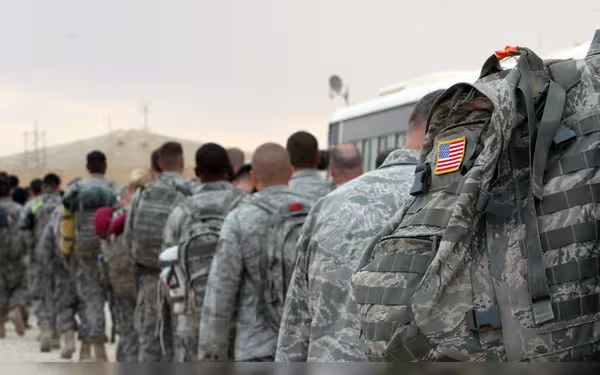Saturday, November 16, 2024 08:35 PM
US Troops to Withdraw from Iraq Under New Agreement
- US military mission in Iraq to conclude by September 2025.
- Iraqi leaders push for reduced foreign troop presence.
- Ongoing US support for counter-Daesh operations in Syria.
 Image Credits: arabnewspk
Image Credits: arabnewspkThe US agrees to withdraw troops from Iraq, marking a significant shift in military strategy amid ongoing regional tensions.
In a significant development, the United States has reached an agreement with the Iraqi government to conclude its military mission in Iraq, which has been ongoing for nearly two decades. This decision comes as part of a broader strategy to combat the Daesh group, also known as ISIS, and marks a pivotal moment in the relationship between the two nations. The agreement was announced on a Friday, indicating a shift in the presence of US troops in Iraq, where approximately 2,500 American soldiers are currently stationed.
The Biden administration has not disclosed the exact number of troops that will remain in Iraq after the transition, leading to speculation about the future of US military involvement in the region. Pentagon deputy press secretary Sabrina Singh stated, "I think it’s fair to say that, you know, our footprint is going to be changing within the country," but did not provide further details. This ambiguity raises questions about the long-term strategy of the US in Iraq, especially in light of the ongoing tensions in the Middle East.
The announcement comes at a time of heightened conflict in the region, particularly between Israel and Iranian-backed groups such as Hezbollah and Hamas. US bases in Iraq have faced increased attacks from Iran-backed militias, particularly following the outbreak of the Israel-Hamas war nearly a year ago. This context underscores the complexities of the US military presence in Iraq, which has been a contentious issue for Iraqi officials and the public alike.
For years, Iraqi leaders have called for the withdrawal of foreign troops, and discussions regarding the reduction of US military presence have been ongoing. The agreement outlines a two-phase transition for US troops, with the first phase set to conclude by September 2025. During this phase, the coalition mission against Daesh will officially end, and some longstanding bases will be vacated. Notably, American forces are expected to begin departing from Ain Al-Asad air base and Baghdad International Airport, relocating to Hareer base in the Kurdistan region.
The second phase of the agreement will see the US maintaining a presence in Iraq through 2026, primarily to support counter-Daesh operations in neighboring Syria. This ongoing involvement suggests that while the nature of the US military mission is changing, the commitment to combating terrorism in the region remains a priority.
Iraqi Prime Minister Mohammed Al-Sudani expressed optimism about the agreement, stating, "We have taken an important step in resolving the issue of the international coalition to fight Daesh." However, the continued presence of US troops has been a source of political tension for his government, which is navigating the delicate balance between US and Iranian influence in Iraq.
Critics of the withdrawal caution that the recent surge in Daesh attacks in Syria indicates that the situation remains precarious. Charles Lister, a senior fellow at the Middle East Institute, noted that the withdrawal is not due to the defeat of Daesh but rather a reflection of the Iraqi government's desire to limit American military presence. This sentiment highlights the complex dynamics at play in Iraq, where the government must contend with both internal and external pressures.
The history of US involvement in Iraq is marked by significant events, including the 2003 invasion based on claims of weapons of mass destruction, which were later proven false. Over the years, the number of US troops fluctuated, peaking at over 170,000 during counterinsurgency operations in 2007. The eventual drawdown in 2011 left a small contingent of military personnel to assist with security operations, but the rise of Daesh in 2014 necessitated a renewed US presence.
As the US prepares to transition its military role in Iraq, the implications of this agreement will be closely monitored. The future of US-Iraq relations, the stability of the region, and the ongoing fight against terrorism will all hinge on the successful implementation of this agreement. Ultimately, while the withdrawal of troops may signal a new chapter, the challenges facing Iraq and its security forces remain significant. The world will be watching closely to see how this situation unfolds and what it means for the broader geopolitical landscape.













